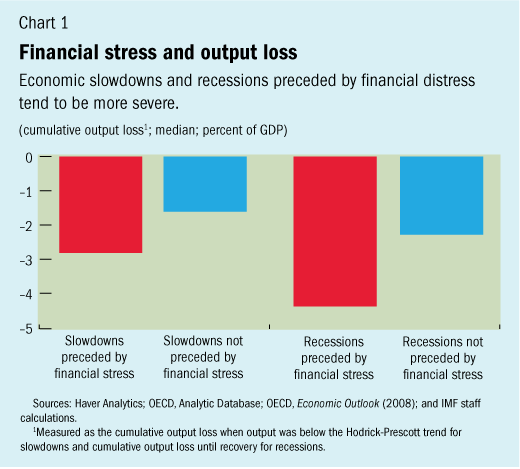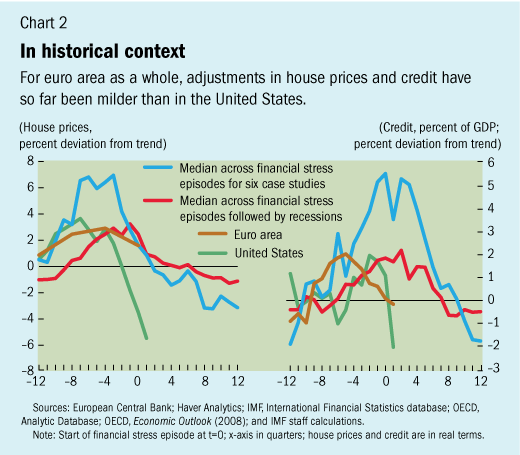
Typical street scene in Santa Ana, El Salvador. (Photo: iStock)
IMF Survey: Financial Stress Likely to Hit Real Economy Hard
October 2, 2008
- Banking distress often leads to severe, protracted economic downturns
- Downturns more likely after rapid credit expansion, rising house prices
- Arms-length financial systems vulnerable to sharper economic contractions
Episodes of financial turmoil that are characterized by stress in commercial and investment banks are more likely to be associated with severe and protracted economic downturns, according to new IMF research.

Household consumption behavior may play much larger role in current U.S. downturn than is typical (photo: Michael Nagle/Getty Images)
MARKETS AND ECONOMIC DOWNTURNS
Published in an analytic chapter of the October 2008 World Economic Outlook, entitled "Financial Stress and Economic Downturns," the research shows that when financial stress hits core financial intermediaries, the downturns that follow are typically more severe than slowdowns or recessions not preceded by financial stress (see Chart 1). In particular, slowdowns or recessions preceded by banking-related stress tend to involve 2-3 times greater cumulative output losses and tend to endure 2-4 times as long.

The chapter constructs an index of financial stress in banking, securities, and foreign exchange markets in 17 advanced economies over the past 30 years and identifies 113 episodes of financial stress. Of these, about one-half are identified as banking related, while in the remainder, the stress is mainly concentrated in securities and foreign exchange markets. Based on this metric, the current financial turmoil ranks as one of the most intense for the United States and one of the most widespread, affecting virtually all countries in the sample.
When is stress linked to slowdown?
The research finds that not all episodes of financial stress are followed by a slowdown or a recession, and initial conditions are crucial. The degree to which house prices and aggregate credit have risen prior to the stress episode is associated with the likelihood of a sharper downturn. Moreover, while greater reliance on borrowing by firms is associated with a sharper downturn in the aftermath of financial stress, the size of financial imbalances in the household sector is crucial in determining whether the downturn will turn into a recession.
Role of financial innovation
The research finds that financial innovation and the move toward more arms-length financial systems—where a greater share of intermediation is channeled through securities markets rather than traditional relationship-based banking—has not increased the likelihood of banking-related financial stress. But activity tends to be weaker in the recessions following banking stress in more arms-length financial systems.
A potential explanation for why banking stress in arms-length systems is associated with more severe slowdowns in activity is because of the procyclicality of leverage. While the so-called twin engines of financial intermediation—banking and securities markets—could be expected to provide alternative channels of financing, the research finds that leverage tends to be more procyclical even in banks in more arms-length financial systems.
As a result, when a shock hits the system, the process of deleveraging among banks is more abrupt in more arms-length financial systems, which may more adversely affect the availability of credit to the rest of the economy.
The current crisis in context
The chapter places the current episode of financial turmoil in historical context by comparing it to six well-known episodes of financial stress among advanced economies during the 1990s. These episodes related to Finland, Norway, Sweden, the United Kingdom, and the United States in the early 1990s, and Japan throughout the 1990s.
This comparison confirms the finding that the rapid buildup in credit and house prices and a heavier reliance on credit by firms and households were associated with a more severe economic downturn in the aftermath of banking distress.
Relative to these episodes of financial stress, the adjustments and imbalances in initial conditions thus far appear to be tracking previous stress episodes followed by recession along a number of dimensions. The deleveraging process of households in the United States is even proceeding faster than in typical past recessions, although that for corporates seems to have proceeded somewhat more slowly, and more importantly, from a stronger initial position.
Role of residential investment
More generally, corporate balance sheets and firms' reliance on external financing were on a more solid footing entering into the current crisis, which should provide some resilience. However, the sheer size of the U.S. mortgage market, which is at the heart of the current crisis, and the role of residential investment suggest that household saving and consumption behavior may play a much larger role in the current downturn than is typical.
On a positive note, the policy stance in the United States has been proactive, as exemplified by the aggressive cuts in policy rates and the measures taken to shore up liquidity in both the commercial and investment banking sectors, as well as ongoing initiatives to directly support the mortgage market.

For the euro area as a whole, the adjustment in house prices and credit has thus far been milder than in the United States, although recent evidence indicates the adjustment is gathering momentum. Firms are also starting from a stronger base in terms of their reliance on external financing.
The household sector's position in the euro area is considerably stronger, and this is a distinguishing feature of financial stress episodes that are not followed by recessions (see Chart 2). While true for the euro area as a whole, there are of course important inter-country differences.
Overall, as the study finds, when financial stress is centered around the banking system, the adverse effects on subsequent economic activity in the affected countries tend to be greater than other types of financial stress, and speedy policy responses can help alleviate the economic costs of financial stress.
Comments on this article should be sent to imfsurvey@imf.org







